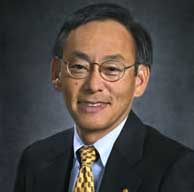Steven Chu
|
Learn more from the Center for Media and Democracy's research on climate change. |
Steven Chu has been appointed by President-elect Barack Obama as Energy Secretary in his administration.[1] He is currently the Director of the Lawrence Berkeley National Laboratory, a position that he has held since the start of August 2004.[2] Since his appointment Chu has repeatedly emphasized the reality and potential severity of human-induced global warming.
Contents
Background
A biographical profile distributed by the Obama transition team stated that Chu is "director of Lawrence Berkeley National Lab, and professor of physics and molecular and cellular biology at University of California, Berkeley. Winner of the Nobel Prize for physics in 1997, Dr. Chu served on the technical staff at AT&T Bell Labs (1978 –1987) and was a professor in the Physics and Applied Physics Departments at Stanford University (1987 – 2004). One of the world's most distinguished scientists, Dr. Chu commands deep respect from his peers, deftly manages a complex governmental organization, and has a keen sense of public service. He successfully applied the techniques he developed in atomic physics to molecular biology, and since 2004, motivated by his deep interest in climate change, he has transformed the Lawrence Berkeley National Lab into a broad and innovative research program on energy technologies. He has a BS in physics from the University of Rochester and his Ph.D from UC-Berkeley."[1]
Joint Project with BP
As the director of the Energy Department-funded Lawrence Berkeley National Laboratory, Chu helped broker "the largest university-industry alliance in U.S. history, the $500 million Energy Biosciences Institute." The biofuels research institute involves the Berkeley lab, two public universities and oil giant BP. Chu pitched BP's deal to the UC-Berkeley Academic Senate, one-third of whose members voted against it. Chu also promoted the institute on campus, saying "money" was the only reason more biofuels research wasn't already underway. The university's compromise agreement gave BP half of the seats on the board governing the institute. As Energy Secretary, Chu will likely "face pressure to partner with corporations in pursuing technological solutions to climate change," notes Harkinson in Mother Jones. "As the incoming Obama administration prepares to spend liberally to develop cleaner sources of energy, the structure of corporate-government partnerships will determine how the profits of that research return to taxpayers, and how rigorously scientists evaluate the downsides of controversial technologies such as biofuels."[3]
Notable Quotes
- July 8, 2005: "We think energy efficiency and conservation can reduce consumption by as much as a factor of 5, but the final problem remains: we have got to stop the Co2 emissions".[4]
- July 21, 2005: "Because of global warming, I stress that we have to find sources that do not add more CO 2 into the atmosphere. Because of this requirement, I have great concern over new investments in conventional coal-burning plants. There is a potential that carbon sequestration will allow us to convert coal into syngas (mostly carbon monoxide and hydrogen) and then capture and sequester CO 2 by-products under ground, but this technology is not yet proven. While we investigate the feasibility of this approach, we should look at other alternatives." [5]
- "Fission energy has significant issues: long term waste storage and the potential proliferation of nuclear weapons materials. Despite these issues, it needs a second look, especially if radioactive waste can be greatly reduced by recycling and burning down long-lived radioactive products into shorter-lived waste without the separation of plutonium. People are now beginning to talk about reducing the amount of waste by a factor of at least a factor of 10- 20 and reducing the storage time to 1000 years instead of several hundred thousand years."
Articles and Resources
Related SourceWatch Articles
References
- ↑ Jump up to: 1.0 1.1 Barack Obama, "President-elect Barack Obama announces key members of energy and environment team", Media Release, December 15, 2008.
- ↑ "Director Announces New Berkeley Lab Senior Management Team", Media Release, February 22, 2005.
- ↑ Josh Harkinson, "Is Steven Chu BFF With BP?", Mother Jones, December 18, 2008.
- ↑ Steven Chu, ""Biological Solution to the Energy Crisis", Lecture at Chiang Kai-Shek Memorial Hall, Taipei, Taiwan, July 8, 2005.
- ↑ Steven Chu, "Synopsis of a Commonwealth Club Speech given on July 21, 2005", Lawrence Berkeley National Laboratory website, accessed January 2009.
External Articles
Biographical notes
- "Steven Chu: The Nobel Prize in Physics 1997", Nobel Foundation, 1997.
- "Steven Chu, Director, Lawrence Berkeley National Laboratory", Lawrence Berkeley National Laboratory website, accessed January 2009.
U.S. Senate Confirmation Hearing
- Steven Chu, "Statement of Steven Chu, Secretary of Energy-Designate Before the Committee on Energy and Natural Resources U.S. Senate", January 13, 2009.
Speeches, Articles and Interviews with Chu
- "Chu on Alternative Energy and Climate Change", Lawrence Berkeley National Laboratory", Lawrence Berkeley National Laboratory website, accessed January 2009.
- Robert Birgeneau and Steven Chu, "On Our Energy Future: UC-BP partnership offers path to energy independence", San Francisco Chronicle, April 15, 2007.
- Steven Chu, "Power to the people - and how to keep it coming", San Francisco Chronicle, July 17, 2005.
- Steven Chu, ""Biological Solution to the Energy Crisis", Lecture at Chiang Kai-Shek Memorial Hall, Taipei, Taiwan, July 8, 2005.
- Steven Chu, "Synopsis of a Commonwealth Club Speech given on July 21, 2005", Lawrence Berkeley National Laboratory website.
- Michael Anastasio, Michael Kluse, Samuel Aronson, Thom Mason, Steven Chu, George H. Miller, John Grossenbacher, Robert Rosner, Thomas Hunter and Sam Bhattacharyya, A Sustainable Energy Future: The Essential Role of Nuclear Energy, Lawrence Livermore Laboratories, August 2008.
General Articles
- "Obama Picks Berkeley Lab Director Steve Chu for Energy Secretary", Lawrence Berkeley National Laboratory", Lawrence Berkeley National Laboratory website, accessed January 2009.
- Steven Mufson and Philip Rucker, "Nobel Physicist Chosen To Be Energy Secretary: Browner, Two Others to Get Climate Posts," Washington Post, December 11, 2008.
| This article is a stub. You can help by expanding it. |

